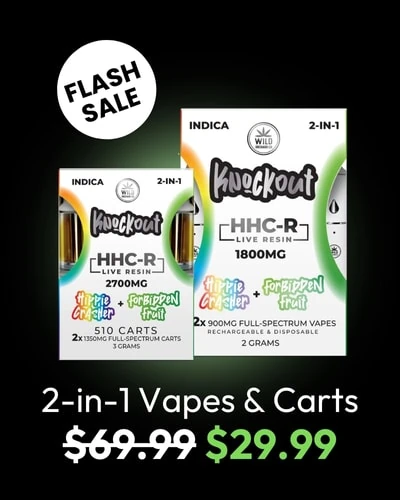Does HHC Get You High? An Introduction to Hexahydrocannabinol
Hexahydrocannabinol, or HHC, can indeed get you high, though its effects are generally milder compared to THC. Derived from hemp, HHC is created through a process called hydrogenation, transforming CBD into this less potent cannabinoid.
- Chemical Similarity: HHC is similar to THC but with added hydrogen atoms.
- Legal Status: HHC is legal under federal law when derived from hemp.
- Psychoactive Effects: Typically produces a mild, manageable high.
- Common Forms: Available in products like vapes and edibles.
- Research Needs: More studies are needed to fully understand its effects.
While HHC does offer psychoactive effects, it is often considered a softer alternative to THC, making it attractive to those who prefer a less intense experience. As the market for HHC grows, understanding its impact becomes crucial, particularly in terms of long-term safety and therapeutic potential.
The High Effect: What HHC Does to You
Exploring the effects of HHC can be an intriguing journey for many, especially those accustomed to other cannabinoids like THC and CBD. Known as Hexahydrocannabinol, HHC is a compound that shares some similarities with THC, yet it’s distinct enough to warrant its own discussion, particularly regarding the kind of high it produces.
Hexahydrocannabinol is synthesized through a process called hydrogenation, where the CBD extracted from hemp is transformed, increasing its hydrogen content. This process not only alters its chemical structure but also its psychoactive properties. Here’s what we know:
- Subtle Effects: Many report that HHC provides a gentler high compared to THC.
- Duration and Intensity: The effects are noted to last sufficiently but with less intensity, which can be preferable for daytime use.
- Product Varieties: Available in several forms, including vapes and edibles, which influence how quickly it acts.
Further into the experience of HHC, users often appreciate the subtlety it offers. Unlike THC, which can sometimes lead to overwhelming effects, Hexahydrocannabinol tends to offer a more measured experience, making it a candidate for those looking to maintain more control over their cognitive state. The milder high also suggests potential for relaxation and stress relief without significant impairment, a characteristic that is gradually drawing more users to this particular cannabinoid. As research expands and more products hit the market, the nuances of HHC’s effects will become clearer, providing a fuller picture of its place in the cannabinoid spectrum.

HHC’s Impact on Perception and Sensation
HHC, or Hexahydrocannabinol, has garnered interest for its subtle yet notable impact on perception and sensation. Often compared to THC, HHC offers a unique twist on the traditional high, leading many to explore its effects.
- Perceptual Shifts: Users often notice subtle changes in visual and auditory perception.
- Sensory Enhancement: Many report enhanced colors and sounds.
- Emotional Effects: HHC can elevate mood, providing a sense of well-being.
- Onset Time: The effects can begin within minutes when vaped.
- Duration: Typically, the sensations can last several hours.
In exploring how HHC affects the senses, users describe an experience that aligns closely with a feeling of light euphoria and enhanced sensory awareness, without the overwhelming intensity often associated with THC. This milder high makes HHC a popular choice for those seeking less intrusive effects, allowing them to enjoy enhanced perceptions while maintaining a clearer headspace. As HHC continues to make its mark, understanding its full sensory impact remains a key area of interest, promising new insights into how cannabinoids can subtly alter our sensory experiences.

Comparing Effects: HHC High vs. Traditional THC
When exploring the effects of HHC, it’s helpful to compare it to traditional THC, a well-known psychoactive compound. Both cannabinoids interact with the brain’s endocannabinoid system, yet they do so in subtly different ways.
- Psychoactive Intensity: It is often perceived as less intense than THC.
- Duration of Effects: Effects may last similarly to THC, but users report a smoother comedown.
- Anxiety and Paranoia Levels: Lower instances of anxiety and paranoia with HHC.
- Legal Accessibility: HHC is more legally accessible in some regions, unlike THC.
- Consumer Preference: Some users prefer it for daytime use due to its milder high.
The experience with HHC can be akin to a milder version of a THC high, making it suitable for users looking for less potent effects. While THC is known for its strong euphoric and sometimes overwhelming effects, HHC offers a more controlled and steady experience. This can be particularly appealing for those new to cannabis products or those who prefer a lighter effect for daily activities. Understanding these differences helps consumers make informed choices based on their needs and the legal status in their area, ultimately enhancing their experience with cannabinoid-based products.

Scientific Viewpoint: The Psychoactive Nature of HHC
Understanding the psychoactive nature of HHC begins with a look at its chemical structure and how it interacts with the body’s endocannabinoid system. Unlike THC, which is directly derived from the cannabis plant, HHC is synthesized through a process that modifies the hydrogen content of the molecule.
- Chemical Structure: HHC is THC with added hydrogen atoms, altering its potency and effects.
- Binding Efficiency: It binds with CB1 and CB2 receptors in the brain but with slightly different efficacy.
- Psychoactive Potency: Generally considered to be milder than THC.
- Onset and Duration: Effects can vary based on the method of consumption and individual metabolism.
- Legal Status: More accessible legally in some regions compared to THC.
In the scientific community, there’s a growing interest in HHC due to its unique properties and potential applications. While research is still in its early stages, initial studies and user reports suggest that HHC provides a high that is less intense than that of THC, which might appeal to those looking for milder effects. This cannabinoid is becoming popular in areas where traditional THC products are heavily regulated or banned, offering a legal alternative that still interacts with the same receptor systems. As more data becomes available, the understanding of HHC’s psychoactive nature will continue to evolve, likely increasing its acceptance and usage.

Breaking Down the High: HHC’s Interaction with Brain Receptors
HHC, or Hexahydrocannabinol, engages with the brain’s cannabinoid receptors in a way that’s similar to THC, yet distinct enough to offer a different experience. This interaction is at the heart of understanding how HHC may produce a high that many find to be milder and more manageable.
- Binding Dynamics: HHC interacts with CB1 receptors in the brain, which are pivotal in modulating psychoactivity.
- Effect Subtlety: Known for a less intense high, making it suitable for users seeking lighter effects.
- Neurochemical Impact: It influences neurotransmitter systems but less profoundly than THC.
- User Variance: The psychoactive experience can vary, reflecting personal biochemistry and tolerance.
- Research Insights: Emerging studies suggest a nuanced understanding of its pharmacological profile.
HHC’s unique properties mean it doesn’t just mimic THC but instead offers an alternative with potentially fewer cognitive disruptions. This characteristic appeals to those who value clarity but desire the therapeutic and recreational benefits of cannabinoids. As understanding deepens and more data becomes available, HHC could become integral to discussions about safe and effective cannabinoid use.

Legal and Health Considerations
Legal Status: Can HHC’s High Cause Legal Issues
Navigating the legal landscape for HHC is crucial for both consumers and distributors, especially considering its psychoactive properties. Unlike THC, HHC exists in a somewhat gray area due to its synthetic derivation from hemp, which is legal under federal law.
- Federal Law: Under the 2018 Farm Bill, hemp and its derivatives with less than 0.3% THC are legal.
- State Regulations: Some states have specific restrictions on synthetic cannabinoids.
- Legal Comparison: Less regulated than THC but more scrutiny than CBD.
- Purchasing Legally: Ensure products are sourced from reputable, compliant suppliers.
- Potential Risks: Legal ambiguities can pose risks for uninformed users.
Understanding the legal status of HHC is complicated by its synthetic nature and varying state laws. While federally legal if derived from hemp with THC levels under 0.3%, state laws may differ, with some banning all synthetic cannabinoids. This makes it essential for users and sellers to stay informed about the latest legal developments to avoid potential legal issues. As the legal landscape evolves, staying updated through reliable sources and legal advice is paramount to safely navigating HHC’s use and distribution.
Health Considerations: Safety of the High
Considering the safety of HHC and whether it gets you high involves understanding its effects on health. As a relatively new substance in the cannabinoid family, the full extent of HHC’s safety profile is still under investigation.
- Current Research: Studies are ongoing but limited in scope.
- Comparison with THC: Less potent, potentially reducing typical THC-related risks.
- Side Effects: Includes dry mouth, altered perception, but generally milder.
- Dependency Potential: Early indications suggest lower addictive properties than THC.
- User Reports: Anecdotal evidence points to a favorable safety profile with careful use.
In further exploration of HHC’s safety, it’s crucial to consider both the short-term and potential long-term effects of its use. Unlike more extensively studied cannabinoids, HHC’s market history is shorter, making definitive conclusions about its safety harder to draw. However, preliminary reports and user experiences suggest that with responsible use and proper dosing, HHC can be enjoyed without the intense side effects associated with stronger psychoactive substances. Ongoing research and increased user feedback will play vital roles in shaping the understanding of HHC’s health implications.

Consumption and Dosage
HHC Dosage: How Much for the Desired Effect?
Determining the right dosage of HHC for achieving the desired high can be a nuanced process, as it varies widely depending on individual tolerance and the form of HHC being used.
- Method of Consumption: Different forms, like vapes or edibles, affect dosage and impact.
- Starting Dosage: New users should start with a small amount, such as 5-10mg.
- Individual Tolerance: Users with prior cannabinoid exposure may require higher doses.
- Effects Timing: Inhalation acts faster than edibles, impacting dosage decisions.
- Adjusting for Effect: Users may need to adjust doses based on initial responses.
For most users, finding the right balance is key to enjoying HHC’s benefits without undesirable side effects. This involves starting with a lower dose and gradually increasing it if needed, always paying attention to how one feels after each use. As with any psychoactive substance, the aim should be to find the minimum effective dose that provides the desired effects. Monitoring and adjusting the dosage of HHC is crucial, particularly because its market and research landscape is still evolving. Guidance from experts and adherence to the latest research can help users make informed decisions about their HHC intake.

Methods of Consuming HHC for Optimal Effects
Choosing the right method for consuming HHC can significantly affect the quality of the high and overall experience. Each method has its unique onset time and duration of effects, which can cater to different preferences and needs.
- Vaping: Quick onset, effects felt within minutes.
- Edibles: Longer to kick in, lasting several hours.
- Tinctures: Sublingual use leads to fast absorption.
- Capsules: Consistent dosage, delayed onset.
- Topicals: Localized relief without psychoactive effects.
In further discussion: The method of consumption directly influences how quickly and intensely HHC affects the user. Vaping HHC offers immediate results, making it ideal for those seeking quick relief or immediate relaxation. Edibles, on the other hand, provide a longer-lasting effect, which can be more suitable for managing chronic conditions or ensuring prolonged comfort. Tinctures offer a middle ground with fairly quick absorption and a manageable duration. Understanding these differences can help users choose the method that best fits their lifestyle and desired outcomes, enhancing both safety and enjoyment of HHC’s effects.

Social and Solitary Use: HHC’s Varied High in Different Settings
The experience of HHC can vary greatly depending on whether it is used socially or in solitude. Each setting can influence the intensity and nature of the high, making HHC a versatile choice for different types of users.
- Social Use: Enhances sociability and mood, lighter doses recommended.
- Solitary Use: Allows for deeper relaxation and introspection.
- Setting Impact: The environment can amplify or mellow the effects.
- User Preference: Some prefer the energetic buzz in social settings, while others enjoy calmness alone.
- Adaptability: HHC’s effects can be tailored to suit the setting through dosage control.
In a more solitary setting, users often report that HHC helps in winding down or engaging in creative activities, where the subtle high does not overpower their focus or creativity. In contrast, in social scenarios, HHC can enhance conversations and overall enjoyment without the sometimes overwhelming effects associated with stronger cannabinoids. This adaptability makes HHC appealing to a broad audience, capable of enhancing various experiences while maintaining a level of control preferred by the user.

F.A.Q.s
What is an HHC high like?
An HHC high is typically milder than a THC high, often described as relaxing and uplifting without overwhelming psychoactive effects.
How many hits of HHC get you high?
The number of hits required to feel high from HHC can vary, but most users report feeling effects after one to three hits, depending on their tolerance and the potency of the product.
What does an HHCP high feel like?
HHCP, a potent analog of HHC, produces a stronger high that users often compare to a potent THC high, with pronounced relaxation and euphoria.
How do you feel after HHC?
After using HHC, users generally feel relaxed and calm, with many reporting a pleasant mood lift and a decrease in stress levels.
Does HHC show up on drug tests?
HHC may not show up on most standard drug tests, but it can metabolize in ways that might trigger a positive result, depending on the sensitivity of the test.
Are there any side effects of using HHC?
Some reported side effects include dry mouth, red eyes, and in rare cases, mild anxiety, similar to other cannabinoids like THC.

Concluding Thoughts on the HHC High
Wrapping up our exploration of whether HHC can get you high, it’s evident that HHC offers a unique experience compared to more familiar cannabinoids like THC. This attribute makes it particularly intriguing for both new and seasoned cannabinoid users.
- Milder High: Users often experience a gentler high than THC.
- User-Friendly: Suitable for those sensitive to stronger effects.
- Versatility: Effective in various forms, from vapes to edibles.
- Broad Appeal: Attracts a diverse audience looking for milder psychoactive effects.
- Legal Leverage: Generally more accessible due to its legal status in many regions.
From the data gathered, HHC emerges as a promising compound for those seeking a high that doesn’t overwhelm, providing a functional, lighter alternative to THC. Its legal status, while still in flux, offers more accessibility compared to regulated THC products, making it a go-to for many looking for legal ways to experience the benefits of cannabinoids. As the market for HHC expands, its distinct properties continue to attract research and consumer interest, paving the way for a better understanding of its full potential and implications.

 Flash Sale
Flash Sale  Party Bundle
Party Bundle  Back in Stock!
Back in Stock! 










